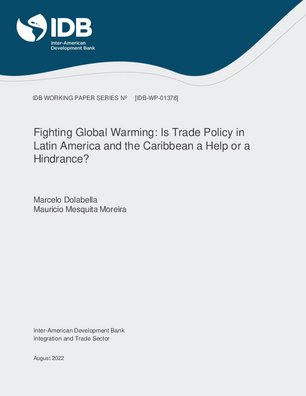Fighting Global Warming: Is Trade Policy in Latin America and the Caribbean a Help or a Hindrance?
Date issued
Aug 2022
Subject
Integration and Trade;
Global Warming Politics;
Tariff System;
Climate Change;
Policy Making;
Trade Policy;
Trade Impact;
Mode of Transport;
Greenhouse Gas Emission
JEL code
F13 - Trade Policy • International Trade Organizations;
F14 - Empirical Studies of Trade;
F18 - Trade and Environment;
H23 - Externalities • Redistributive Effects • Environmental Taxes and Subsidies;
Q56 - Environment and Development • Environment and Trade • Sustainability • Environmental Accounts and Accounting • Environmental Equity • Population Growth
Category
Working Papers
The dire prospects of global warming have been increasing the pressure on policymakers to use trade policy as a mitigation tool, challenging trade economists canonical “targeting principle.” Even though the justifications for this stance remain as valid as ever, it no longer seems feasible in a world that is already engaging actively in using trade policy for climate purposes. However, the search for second-best solutions remains warranted. In this paper, we focus on the climate benefits of tariff reform for a broad sample of Latin American and Caribbean countries, drawing on Shapiros (2021) insights about the environmental bias of trade policy. Using a partial equilibrium approach and GTAP 10-MRIO data for 2014, we show that even though there is evidence of a negative bias toward “dirty goods” in half of the countries studied, translating this into actionable tariff reforms is plagued by interpretation and implementation difficulties, as well as by jurisdictional and efficiency trade-offs. There are also questions about their efficacy in curbing greenhouse gas emissions.
Generative AI enabled




